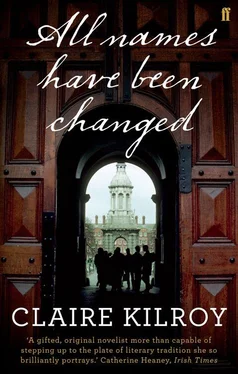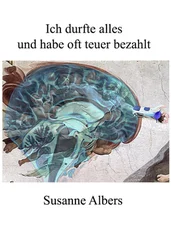Claire Kilroy - All Names Have Been Changed
Здесь есть возможность читать онлайн «Claire Kilroy - All Names Have Been Changed» весь текст электронной книги совершенно бесплатно (целиком полную версию без сокращений). В некоторых случаях можно слушать аудио, скачать через торрент в формате fb2 и присутствует краткое содержание. Год выпуска: 2010, Издательство: Faber & Faber, Жанр: Современная проза, на английском языке. Описание произведения, (предисловие) а так же отзывы посетителей доступны на портале библиотеки ЛибКат.
- Название:All Names Have Been Changed
- Автор:
- Издательство:Faber & Faber
- Жанр:
- Год:2010
- ISBN:нет данных
- Рейтинг книги:5 / 5. Голосов: 1
-
Избранное:Добавить в избранное
- Отзывы:
-
Ваша оценка:
- 100
- 1
- 2
- 3
- 4
- 5
All Names Have Been Changed: краткое содержание, описание и аннотация
Предлагаем к чтению аннотацию, описание, краткое содержание или предисловие (зависит от того, что написал сам автор книги «All Names Have Been Changed»). Если вы не нашли необходимую информацию о книге — напишите в комментариях, мы постараемся отыскать её.
All Names Have Been Changed — читать онлайн бесплатно полную книгу (весь текст) целиком
Ниже представлен текст книги, разбитый по страницам. Система сохранения места последней прочитанной страницы, позволяет с удобством читать онлайн бесплатно книгу «All Names Have Been Changed», без необходимости каждый раз заново искать на чём Вы остановились. Поставьте закладку, и сможете в любой момент перейти на страницу, на которой закончили чтение.
Интервал:
Закладка:
‘What! Whose husband? Jesus Christ Almighty!’
It hadn’t been my intention to raise my voice. Aisling had caught me by surprise. The barman raised an admonitory eyebrow as he topped up our pints. ‘Take it handy there, folks,’ he warned us. Aisling glanced at the others in panic, though they were too far away to have overheard. ‘Nothing, Declan,’ she blurted, ‘I shouldn’t have told you. Forget I said anything, please. ’
This wasn’t the kind of information you could forget in a hurry, and Aisling knew it. Her face flushed red under all the white make-up, making her look stranger still. She had evidently just broken one of the group’s secret confidences, one of those blood oaths with which their little cabal was ridden, and she grew so frantic, so distraught, as she fumbled first with her packet of cigarettes and then with her lighter, all the while begging me to forget she’d opened her mouth, that I backed off altogether to calm her down. Neglecting one to protect another. It was an insane situation, but there you go.
She finally got the cigarette up and running, and the two of us stood watching the other three conversing with Glynn as if nothing was amiss. You know her husband beats her, don’t you? Aisling hadn’t specified which of them was beaten, but it was hardly the time to ask. Faye was the only one who was married. Though Antonia technically had a husband still, in the eyes of the Irish State.
*
Faye, kind Faye, waved her hand and called my name as I was wandering through the red and black gloom of Bartley Dunne’s, pint in hand. Imagine my surprise to encounter my fellow writing students. And the Professor too, as luck would have it. I stood there, smiling broadly at the lot of them.
They seemed pleased enough to see me, at any rate. Glynn interrupted his song to throw an arm out in welcome. ‘Dermot!’ he cried, knocking over his pint. The women had made him giddy. Guinevere stemmed the spillage by dealing a dam of beer mats with the air of one with much practice in this field. ‘Sit down there now like a good man,’ Glynn instructed me. I set my pint on the table and took my rightful place amongst them, the six of us crammed into a booth.
How delicate and colourful the girls were. It was like sitting in a flowerbed. I knew I was too big for them, too awkward, too crude. Didn’t matter: I scrunched in tighter. Glynn leaned across. ‘You’ve got your knees under the table now, so you have, ya boyo!’ he winked. Aisling went to the bar to replace his pint.
‘Did you follow us here?’ Antonia demanded.
Guinevere laughed. ‘God almighty, of course he didn’t follow us here. What sort of weirdo would do a thing like that?’ Ya fucken perv. Spying on the kiddies.
‘I often drink in Bartley’s,’ I told them.
‘Do you have family in Dublin, Declan?’ Faye asked, keen to introduce a neutral subject.
‘No, I’m an only child.’
‘Oh right. So do you go home to your parents at the weekends?’
‘Ah no. The mother doesn’t know I left England.’
Antonia lowered her drink. ‘Your mother doesn’t know you left England?’
‘Yeah. She thinks I’m still in Leeds.’ They were all looking at me now.
‘But why?’ asked Faye.
‘She’d be really upset if she knew I’d given up a good job to do, well …’ I gestured at the table, ‘ this. So I didn’t tell her.’ Blank faces. ‘She’d have thought Daddy would have disapproved,’ I added, sensing more was needed.
Guinevere frowned. ‘Your father doesn’t know you’re here either?’
‘No, he passed away.’ Daddy had been dead the past twenty years, yet despite his absence, no family decision was made without reference to him, without an agonised consideration of his feelings. Since he had been a quiet man, loath to complain, it had always been difficult to gauge what might have attracted his unspoken displeasure. There were no set rules. Like the Irish language, he had to be learned by ear.
‘They were quite old when they had me,’ I offered, talking to fill the gap. ‘From a different era, really. More like grandparents, in fact.’ I was as struck by this information as the girls. I hadn’t looked at it that way before. My ageing parents had treated me as politely and tactfully as a guest staying in their home. Ours had been a reticent household, for the most part.
Antonia found it uncontrollably amusing that my mother referred to her deceased husband as Daddy. Really, she could barely contain herself. She repeated my mother’s words to stoke herself up again when her amusement waned: Daddy would have preferred to see you settle. ‘Priceless,’ she said, wiping away a tear. Faye whispered to Antonia to for God’s sake leave poor Declan alone.
‘Write it down,’ said Glynn, ‘Write it down.’ He had a tendency to issue words of advice twice, in order to imbue them with the quality of axiom. A few observations regarding the state of mind of the artist might be appropriate at this juncture, in the interests of posterity. I hadn’t seen him execute the office of Great Irish Writer so movingly before. He sat amongst us in some class of reverie, head tilted back, eyes shut, basking in the glory of female company. His boyish good looks were extant in sufficient measure to make you nostalgic for the handsome young poet he once had been, because it was poetry Glynn had started with, yes, it is true, all those years ago when he was purer of mind and had less to say for himself.
They say alcohol has spelled the ruin of many a great Irish writer, but I maintain it is part of what made them great in the first place. It lifts a veil, releases a man from inhibitions, frees the creative spirit. Gazing at Glynn across the table with that half-fledged smile on his face, which expressed his contentment more completely than any fully effected version, I was finally granted what I felt was my first real insight into the internal layout of the writer’s mind. Were Glynn stone-cold sober, I would not have been afforded that licence. A July sunset on a rolling lawn is what I saw. Shadows on the grass as cool and alluring as rock pools. Glynn possessed a working knowledge of the stars which informed his writing, at times infusing it with a celestial dimension, other times foregrounding the staggering insignificance of man. ‘There is a moment when you realise,’ the stricken narrator notes towards the end of Broken Man, as he reflects on the sudden passing of his infant son, ‘that the sun is not the sun, but a dying planet, expiring before your eyes.’
Dr M. J. Hanratty’s biography mentions that Glynn never fully recovered from the shock of the death of his youngest child, Saoirse, who was killed by meningitis at the age of two. It was around then that reports about him beginning with the word ‘troubled’ proliferated in the papers. ‘Troubled author Patrick Glynn was in court today to answer charges of drunk driving.’ ‘Troubled writer P. J. Glynn was expelled from an award ceremony in London’s Guild Hall last night for punching a fellow contestant.’ ‘Troubled novelist Patrick Glynn is recovering from hypothermia in hospital tonight after being found in the water on Brittas Bay.’
But that was a long time ago, a different lifetime, a different Glynn. He had written three astonishing novels since Saoirse’s death, one universally hailed upon publication as a masterpiece. His other daughter, Sofia, was grown and had flown the nest. His house was quiet once more, all strife and clamour behind him. That old grief had surely lost the power to pain him still, not when he had the inestimable consolation of art.
Glynn must have felt my gaze upon him. He opened his eyes and squinted at me through narrowed slits, as if the sun were shining in his face, then winked and shut his eyes once more. The contented half-smile did not falter. It occurred to me that the man knew what I was thinking. I wondered whether he could glimpse the internal layout of other people’s heads too. His work supports the possibility.
Читать дальшеИнтервал:
Закладка:
Похожие книги на «All Names Have Been Changed»
Представляем Вашему вниманию похожие книги на «All Names Have Been Changed» списком для выбора. Мы отобрали схожую по названию и смыслу литературу в надежде предоставить читателям больше вариантов отыскать новые, интересные, ещё непрочитанные произведения.
Обсуждение, отзывы о книге «All Names Have Been Changed» и просто собственные мнения читателей. Оставьте ваши комментарии, напишите, что Вы думаете о произведении, его смысле или главных героях. Укажите что конкретно понравилось, а что нет, и почему Вы так считаете.












